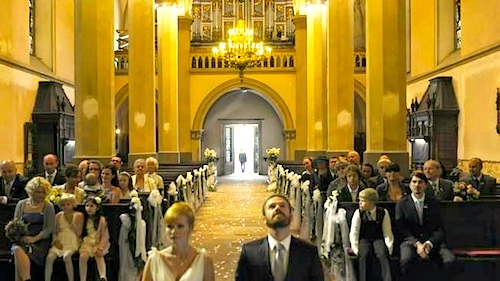By Joe Bendel. Usually, couples keep the wedding simple for second marriages, but not Radim Werner and his fiancée Tereza. At least when you keep a low profile, it makes it harder for unwelcomed guests from the past to crash. There will be no ex-spouses arriving uninvited, but one mystery guest will thoroughly destabilize the celebration in Jan Hrebejk’s Honeymoon, which screens during the rechristened Panorama Europe at the Museum of the Moving Image.
As fate would have it, Werner’s thirteen year-old son Dominik breaks his glasses seconds before the wedding ceremony. Fortunately, there is optometrist-in-the-box right on the church plaza. Werner does not think much of the man behind the counter, but he instantly recognizes him. Calling himself Jan Benda, the mystery man crashes the ceremony and hitches a ride to the reception in the country. He claims to be Werner’s old boarding school friend, but the groom pretends not to remember him. The kids take to Benda, but he unnerves both bride and groom.
It will become obvious the lens crafter is not really Benda, but he shares some complicated history with Werner and the real Benda. The truth is pretty ugly, especially when the newly married bride is forced to confront it. Honeymoon is considered the third installment of Hrebejk’s loosely thematic trilogy, begun with the excellent Kawasaki’s Rose, examining how the sins of the past continue to influence the present. While not explicitly political like Rose, it is worth noting Werner’s boarding school indiscretions indirectly involved his teenaged lust for Natassja Kinski during the height of her international superstardom, suggesting the 1980’s, perhaps thereby implying he was the privileged child of Party elites.
Regardless, Hrebejk successfully taps into viewers’ deep ambivalence regarding weddings and similar conventions. Somewhere deep within our inner Mr. Hydes, we resent having to dress up and be on our best behavior for people we only share an accidental relationship with. Like a Wedding Crashers from Hell, Honeymoon delivers the chaos we secretly yearn for at such times.

Indeed, Hrebejk deftly plays a dual game, creating suspense through not-Benda’s unsettling behavior, while dropping clear hints that he is more worthy of our sympathies. He rather risks undoing the balance act late in the third act, but he certainly keeps us on our toes. Ultimately, the messiness lends Honeymoon further credence.
As the respective nemesis-classmates, Stanislav Majer and Jirí Cerny play a dynamite cat-and-mouse game. They invest both men with sympathetic moments, as well as profound flaws, making it impossible to reflexively align with either one. Anna Geislerova initially seems to be problematically passive as the newlywed bride, but she more than holds her own during a pivotal confrontation with Cerny’s crasher.
Honeymoon is a mature film, in which karma packs a real punch. On one hand, Hrebejk challenges how well one can ever know a prospective spouse, while also questioning whether we can ever out live the moral statute of limitations for our mistakes. Good luck coming up with satisfying answers, but the resulting drama is quite compelling. Recommended for discerning adults, Honeymoon screens this Friday (4/11) at the Museum of the Moving Image, as part of Panorama Europe.
LFM GRADE: B+
Posted on April 7th, 2014 at 5:34pm.